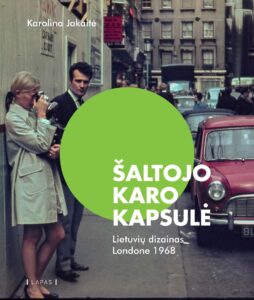KAROLINA JAKAITĖ. The Cold War Capsule

ARTS AND LITERATURE
Karolina Jakaitė, The Cold War Capsule: Lithuanian Design in London, 1968: The Story of One Pavilion (Šaltojo karo kapsulė: Lietuvių dizainas Londone 1968), Vilnius: Lapas, 2019, 255 pp.
The Cold War Capsule: Lithuanian Design in London, 1968: The Story of One Pavilion Karolina Jakaitė | Šaltojo karo kapsulė Vilnius: Lapas, 2019, 255 pp. This widely researched and catchy (hi)story of a single pavilion reads almost like a detective novel. It closely surveys the unique history of Lithuanian design in the context of the Cold War, and the political realities and tensions of the time. Design historian Karolina Jakaitė’s research for this book began in 2008 after she overheard someone mention ‘some exhibition in London’ in passing; then there was also Vaidilutė Grušeckaitė’s op art design of a branch of rue – an important Lithuanian national symbol. The author reconstructs the history of the Soviet Union industrial exhibition which showcased the communist way of life at the Earl’s Court exhibition centre in London in August 1968. Jakaitė focuses her attention on the Lithuanian pavilion – its concept and design created by Tadas Baginskas. This architect and designer emerges as one of the key figures of the book. Rich in archival footage and pictures capturing the London of 1968, Jakaitė’s book walks us through the exhibited objects and specimens of modern manufacturing chosen to represent Soviet Lithuania at the time. Moreover, it gives its readers a glimpse into the impressions of the ‘free world’ that the creators of the pavilion took away with them.
Dr Karolina Jakaitė is a design history researcher, and a lecturer at the Vilnius Academy of Arts. Her research focuses on Soviet Lithuanian design. She is interested in artefacts and the stories of their makers; the processes of contemporary design; everyday culture; and the activities of design institutions. As a curator, she has organised exhibitions and conferences, carried out design history projects, and given public lectures in Lithuania and abroad. She is a co-founder and the head of ‘The Design Foundation’ – a research initiative dedicated to Lithuanian design history.